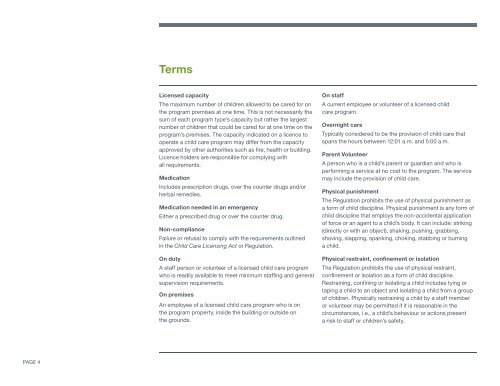child-care-licensing-handbook
child-care-licensing-handbook
child-care-licensing-handbook
Create successful ePaper yourself
Turn your PDF publications into a flip-book with our unique Google optimized e-Paper software.
Terms<br />
Licensed capacity<br />
The maximum number of <strong>child</strong>ren allowed to be <strong>care</strong>d for on<br />
the program premises at one time. This is not necessarily the<br />
sum of each program type’s capacity but rather the largest<br />
number of <strong>child</strong>ren that could be <strong>care</strong>d for at one time on the<br />
program’s premises. The capacity indicated on a licence to<br />
operate a <strong>child</strong> <strong>care</strong> program may differ from the capacity<br />
approved by other authorities such as fire, health or building.<br />
Licence holders are responsible for complying with<br />
all requirements.<br />
Medication<br />
Includes prescription drugs, over the counter drugs and/or<br />
herbal remedies.<br />
Medication needed in an emergency<br />
Either a prescribed drug or over the counter drug.<br />
Non-compliance<br />
Failure or refusal to comply with the requirements outlined<br />
in the Child Care Licensing Act or Regulation.<br />
On duty<br />
A staff person or volunteer of a licensed <strong>child</strong> <strong>care</strong> program<br />
who is readily available to meet minimum staffing and general<br />
supervision requirements.<br />
On premises<br />
An employee of a licensed <strong>child</strong> <strong>care</strong> program who is on<br />
the program property, inside the building or outside on<br />
the grounds.<br />
On staff<br />
A current employee or volunteer of a licensed <strong>child</strong><br />
<strong>care</strong> program.<br />
Overnight <strong>care</strong><br />
Typically considered to be the provision of <strong>child</strong> <strong>care</strong> that<br />
spans the hours between 12:01 a.m. and 5:00 a.m.<br />
Parent Volunteer<br />
A person who is a <strong>child</strong>’s parent or guardian and who is<br />
performing a service at no cost to the program. The service<br />
may include the provision of <strong>child</strong> <strong>care</strong>.<br />
Physical punishment<br />
The Regulation prohibits the use of physical punishment as<br />
a form of <strong>child</strong> discipline. Physical punishment is any form of<br />
<strong>child</strong> discipline that employs the non-accidental application<br />
of force or an agent to a <strong>child</strong>’s body. It can include: striking<br />
(directly or with an object), shaking, pushing, grabbing,<br />
shoving, slapping, spanking, choking, stabbing or burning<br />
a <strong>child</strong>.<br />
Physical restraint, confinement or isolation<br />
The Regulation prohibits the use of physical restraint,<br />
confinement or isolation as a form of <strong>child</strong> discipline.<br />
Restraining, confining or isolating a <strong>child</strong> includes tying or<br />
taping a <strong>child</strong> to an object and isolating a <strong>child</strong> from a group<br />
of <strong>child</strong>ren. Physically restraining a <strong>child</strong> by a staff member<br />
or volunteer may be permitted if it is reasonable in the<br />
circumstances, i.e., a <strong>child</strong>’s behaviour or actions present<br />
a risk to staff or <strong>child</strong>ren’s safety.<br />
PAGE 4


